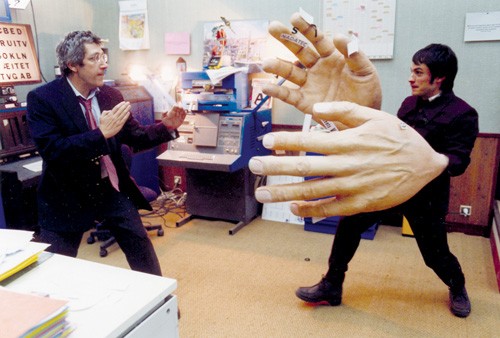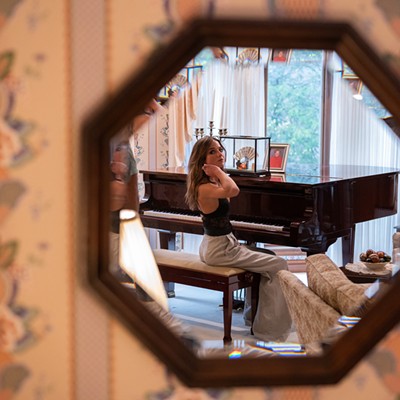If Gael Garcia Bernal didn't exist, then Michel Gondry would have had to invent him.
In Gondry's The Science of Sleep, the charismatic Mexican actor plays Stéphane Miroux (sounds, appropriately, like Miró), a young man who has a hard time distinguishing fantasy from reality. This, in part, was Alvy Singer's problem in Annie Hall. But Stéphane takes it to the next level -- and a half.
He dreams a surreal alternative universe where he's the star of Stéphane TV, a sort of Wayne's World on psychoanalytic uppers, where he tosses a rainbow of ingredients -- like "random thoughts," "reminiscences" and "memories from the past" -- into a pot and whips up a better existence than the one we're all forced by reality to endure.
Stéphane is a melancholy fabulist, born in France but raised in Mexico by his father after his parents split. Now his beloved dad has died of cancer, and he's returned to Paris to live in an apartment owned by his sojourning mom (Miou-Miou), who lured him back by claiming to have found him a "creative" job with a company that makes calendars. In fact, all he does there is cut and paste pre-set lettering above month-by-month images of nudie art.
His office colleagues should delight a lad who revels in the bizarre. A middle-aged horn dog tutors him in the art and philosophy of the dalliance. Two younger employees want him to join their cheerful ski excursions. But Stéphane's bigger problem is Stéphanie (Charlotte Gainsbourg), who shares both his accent aigu and his imagination. Their shy creative just-friendship doesn't last long: When he falls in love with her, he falls hard, and not just because he can fly in his dreams.
It won't take you long to figure out this peripatetic movie: Life sucks, so sometimes the only way to survive is to invent a world of your own. (Gondry's surrealism is more Daliesque than Buñuelian -- more Yellow Submarine than Donnie Darko.) In fact, Stéphane's career goal is to be an inventor: In the course of his relationship with Stéphanie, he devises, among other things, glasses that let you see the world in 3-D ("Isn't the world already in 3-D?" she asks), and a machine that can repeat a quick loop of time from the past or jump a few seconds into the future. Whether he's awake when he invents it is for you to figure out.
At times, this is all somewhat entertaining, especially when Gondry lets Bernal be Bernal. He's a United Nations of charm, fluent in all three of the movie's languages, and also in the art of audience seduction. He looks better in profile than he does straight on, and he uses his body like Gumby. The kid's got talent, and spirit, and a magnetism that's hard to characterize or explain.
Gondry, who is French, co-wrote and directed Eternal Sunshine of the Spotless Mind, and he directed Human Nature, a freakish black comedy of love and science written by Charlie Kaufman, the author of Being John Malkovich (and a co-writer of Eternal Sunshine). These two are the manatee and dugong of 21st-century cinema: no one else is like them, and they're fascinating to watch, if somewhat impossible to love. Their type of movie is at best invigorating (as in Malkovich) but most of the time just too, too much: Gondry even resorts to the hackneyed trope of tossing a TV into the river because it pollutes our mind with junk. He's best when he slows down for those moments of intimacy that let us glimpse, in some realistic proportion, Stéphane's suffering at this transitional moment in his life.
As I left the theater after watching The Science of Sleep, I heard a young man say to his young woman, "That was different." I didn't wait to hear what came next. But with a conversation starter like that, what else is there to say? It's not hard to be different. What's hard, in art, is making "different" add up to something. For all of his rampant imagination, Gondry has told a strikingly familiar bittersweet story of a young man on the verge of an emotional breakdown. And while I'd like to believe Stéphane will get through his troubles with creativity alone, I just can't imagine that. In English, and French andSpanish, with subtitles. Aab
Starts Fri., Sept. 29.















